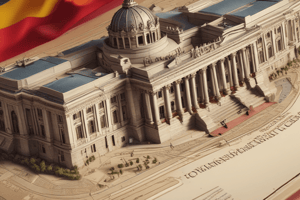Podcast
Questions and Answers
What happens if no presidential candidate receives a majority of the electoral votes?
What happens if no presidential candidate receives a majority of the electoral votes?
- The Senate elects the President.
- The Supreme Court decides the President.
- The House of Representatives elects the President from the three candidates who received the most electoral votes. (correct)
- The electoral college members choose a President.
How is a vacancy in the Vice Presidency filled?
How is a vacancy in the Vice Presidency filled?
- The President gets to choose a replacement without any confirmation.
- The Vice Presidency is left vacant until the next election.
- The President shall nominate a Vice President who shall take office upon confirmation by a majority vote of both Houses of Congress. (correct)
- The Senior Senator from the President's party appoints a successor.
What part of the Constitution outlines the goals of the American Government?
What part of the Constitution outlines the goals of the American Government?
- The Articles of Confederation
- The Bill of Rights
- The Declaration of Independence
- The Preamble (correct)
Which Article explains the Amendment process?
Which Article explains the Amendment process?
What is the significance of the 22nd Amendment regarding the President?
What is the significance of the 22nd Amendment regarding the President?
Which of the following statements is true regarding the President as Chief of State?
Which of the following statements is true regarding the President as Chief of State?
What amendment protects you from unreasonable search and seizure?
What amendment protects you from unreasonable search and seizure?
Which basic principle is considered the cornerstone of the Constitution?
Which basic principle is considered the cornerstone of the Constitution?
What criteria do presidential candidates typically consider when choosing a vice-presidential candidate?
What criteria do presidential candidates typically consider when choosing a vice-presidential candidate?
What are the formal requirements to be President of the United States?
What are the formal requirements to be President of the United States?
Which Amendment guarantees the freedoms of speech, religion, assembly, press, and petition?
Which Amendment guarantees the freedoms of speech, religion, assembly, press, and petition?
What is the process by which an immigrant becomes a U.S. citizen?
What is the process by which an immigrant becomes a U.S. citizen?
What group of people is responsible for electing the U.S. President?
What group of people is responsible for electing the U.S. President?
What is the 'supreme law of the land'?
What is the 'supreme law of the land'?
What is the line of succession to the presidency after the Vice President?
What is the line of succession to the presidency after the Vice President?
How many electoral votes does a presidential candidate need to win?
How many electoral votes does a presidential candidate need to win?
What significant event occurs on January 6th every four years?
What significant event occurs on January 6th every four years?
Why are Independent Agencies considered 'independent'?
Why are Independent Agencies considered 'independent'?
What happens on the Tuesday after the first Monday in November every four years?
What happens on the Tuesday after the first Monday in November every four years?
How are electoral votes assigned to each state?
How are electoral votes assigned to each state?
What is defined as the body of fundamental laws setting out principles of government?
What is defined as the body of fundamental laws setting out principles of government?
Flashcards
What part of the Constitution outlines the goals of the American Government?
What part of the Constitution outlines the goals of the American Government?
The Preamble outlines the goals of the government in the United States.
What is the most common way to ratify an amendment once it has been proposed?
What is the most common way to ratify an amendment once it has been proposed?
The most common way to ratify an amendment is by a three-fourths vote in the state legislatures.
What is the most common way to propose an amendment?
What is the most common way to propose an amendment?
The most common way to propose an amendment is by a two-thirds majority vote in both the House of Representatives and the Senate.
What is federalism?
What is federalism?
Signup and view all the flashcards
Which Article explains the Amendment process?
Which Article explains the Amendment process?
Signup and view all the flashcards
Which Article created the executive branch?
Which Article created the executive branch?
Signup and view all the flashcards
Which Article created the judicial branch?
Which Article created the judicial branch?
Signup and view all the flashcards
Which Article established the legislative branch?
Which Article established the legislative branch?
Signup and view all the flashcards
How does the House decide the President if there's no electoral majority?
How does the House decide the President if there's no electoral majority?
Signup and view all the flashcards
Why do Presidential candidates choose VP candidates?
Why do Presidential candidates choose VP candidates?
Signup and view all the flashcards
Who can challenge the President's return after incapacity?
Who can challenge the President's return after incapacity?
Signup and view all the flashcards
How is a VP vacancy filled?
How is a VP vacancy filled?
Signup and view all the flashcards
What does the 22nd Amendment say about the President's term?
What does the 22nd Amendment say about the President's term?
Signup and view all the flashcards
What is the 'supreme law of the land'?
What is the 'supreme law of the land'?
Signup and view all the flashcards
What is the presidential line of succession?
What is the presidential line of succession?
Signup and view all the flashcards
What are the Vice President's two constitutional duties?
What are the Vice President's two constitutional duties?
Signup and view all the flashcards
How many electoral votes are needed to win the presidency?
How many electoral votes are needed to win the presidency?
Signup and view all the flashcards
How many total electoral votes are there?
How many total electoral votes are there?
Signup and view all the flashcards
What makes the 1824, 1876, 1888, 2000 & 2016 presidential elections significant?
What makes the 1824, 1876, 1888, 2000 & 2016 presidential elections significant?
Signup and view all the flashcards
What happens on January 6th every four years?
What happens on January 6th every four years?
Signup and view all the flashcards
When is Election Day in the US?
When is Election Day in the US?
Signup and view all the flashcards
Study Notes
Constitution Study Guide
- The Preamble outlines the goals of the American government
- A ¾ vote of each legislative chamber is the most common way to ratify an amendment
- A two-thirds majority vote in both the House of Representatives and the Senate is the most common way to propose an amendment
- Federalism is a system of government where power is shared between a central government and several regional governments
- Article 5 explains the amendment process
- Article 2 created the executive branch
- Article 3 created the judicial branch
- Article 1 established the legislative branch
- Framers were dedicated to limited government because they feared a powerful national government, believed that power should be restrained, and felt that power should be divided and shared among state and local governments
- Popular sovereignty is the cornerstone of the Constitution, meaning the people are the only source of power, and the government governs with their consent
- The First Amendment guarantees freedoms of speech, religion, assembly, press, and petition
- The Fourth Amendment protects individuals from unreasonable searches and seizures
- The Eighth Amendment protects individuals from cruel and unusual punishment
- The Second Amendment grants the right to bear arms
- The Sixth Amendment protects the rights of the accused
- The Ninth Amendment states that citizens have rights not listed in the Constitution
- The 26th Amendment gave 18-year-olds the right to vote
- The formal, constitutional requirements to be President include being a US citizen, over 35 years old, and a US citizen for at least 14 years
- Naturalization is the process by which immigrants become US citizens
- The Electoral College is the group of people who elect the President
- Two ways someone qualifies as a natural-born citizen are being born on American soil or both parents being US citizens
Constitutional Principles and Processes
- The Constitution is the supreme law of the land
- The Vice President is 1st in line of succession, followed by the Speaker of the House, President Pro Tempore of the Senate, Secretary of State, Secretary of the Treasury, Secretary of Defense, and the Attorney General are next in succession to the president
- The Vice President's duties include succeeding the president in the event of death or resignation, and presiding over the Senate, casting tie-breaking votes if necessary
- 270 electoral votes are needed to win a presidential election
- 538 electoral votes are available in presidential elections
- Presidential elections have sometimes had the winner lose the popular vote
- The joint session of Congress counts electoral votes on January 6th every four years
- Election Day is the Tuesday after the first Monday in November every four years
- Independent agencies are constitutionally part of the executive branch, but independent of presidential control
- The Cabinet is comprised of subunits and agencies
Presidential Powers and Limitations
- The Electoral College, composed of electors from each state, elects the President
- If no presidential candidate receives a majority of the electoral votes, the House of Representatives selects the president from the top three candidates
- A president can resume duties after incapacitation by informing Congress, but the decision can be challenged
- A Vice Presidential vacancy is filled by the President nominating a Vice President who is confirmed by a majority vote of both Houses of Congress
- As Chief of State, the President is the ceremonial head of the US government
- As Chief Legislator, the President is the main architect of American public policy
- The 22nd Amendment limits the President to two terms in office
- The President's salary is $400,000 per year
Studying That Suits You
Use AI to generate personalized quizzes and flashcards to suit your learning preferences.




